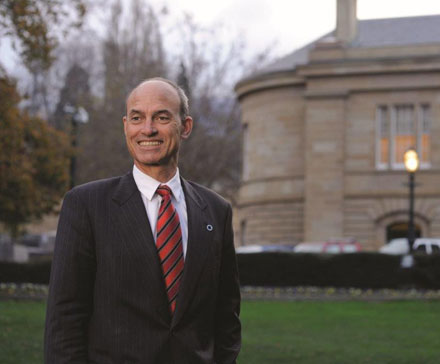
Guy Barnett
Scores of new jobs will be created through a joint venture between TasPorts and Qube Ports to facilitate the export of forest products from Hobart according to Guy Barnett, Tasmanian Resources Minister. Source: The Mercury
It will directly create 25 jobs on the wharf and support many more in the community.
For the forest industry, the new export opportunity is a game-changer that provides a clear path forward to undoing all the damage that was done by Labor and the Greens under their job-destroying forest deal.
In the words of James Neville Smith, chairman of SmartFibre, this is “an exciting and necessary development for private plantation owners in the south of Tasmania as their assets have been stranded since the closure of Triabunna in 2011”.
In fact, SmartFibre, which will provide an export opportunity for FSC Controlled Wood certified plantation wood together with its partner, SFM Forest Products, expects to create an additional 50 direct and indirect jobs.
The joint venture has also been welcomed by the Australian Forest Growers, the Forest Industries Association of Tasmania and the Tasmanian Farmers and Graziers Association.
Importantly, the Southern Export Terminal initiative is a five-year arrangement that will deliver opportunities from early next year. This means it will not impact on the longer-term plans for Macquarie Point.
While some have already sought to promote misconceptions and untruths, forestry can coexist with industries such as tourism and be respectful of community values.
As we have consistently said – there will be no woodchip pile on the Hobart waterfront.
The sale – and deliberate destruction – of the Triabunna woodchip mill and the land locking of the port, cheered on by the Greens, was calculated to hurt the industry.
The previous Labor-Green government reacted by providing a public subsidy for transporting wood residues north. That’s public monies that could, and should, be spent on our hospitals and our schools, which is why the Liberal Government has acted to end the subsidies.
Through our Expressions of Interest process, we have secured commercial solutions for public forest residues. But the Triabunna debacle also made it difficult for private forest owners in the south to gain returns on their investments, as Mr Neville Smith highlighted.
While the industry has been growing under the supportive policies of the majority Liberal Government, this growth has been largely seen in the North and North-West.
Now, the joint venture provides a renewed opportunity for landowners in the South to gain value from their forest operations, turning a liability into an asset. While the export of plantation logs creates a return for landowners and creates jobs in our community, we all want to see more value-adding in Tasmania. That’s why the Liberal Government is investing in innovation in the industry.
Backed by a $1.5 million grant from the Government, Norske Skog has entered a joint venture with the Circa Group to establish a $6.6 million commercial demonstration plant at its Boyer Mill to produce the bio-solvent Cyrene.
The proposal involves processing about 1500 tonnes of wood a year to produce 50 tonnes of Cyrene, which would be shipped overseas where it would be used in the pharmaceutical and other biochemical industries.
If successful, this could lead to a fullscale plant being built here in Tasmania. The Government’s $1.25 million Wood and Fibre Processing Innovation Program, meanwhile, is providing grants to 13 projects focussed on creating value-added products from wood and also plant residues.
In total, the funding will unlock an investment of more than $7 million, with many of the projects looking at the potential of biomass.
The southern export opportunity, together with the industry’s strong commitment to value-adding, supported by the Liberal Government, will help to secure a new era for forestry in Tasmania. And it will do so without impacting on Hobart’s magnificent waterfront.
While the Hobart port is intrinsic to the city’s heritage, it remains a working port, with more than 1.7 million tonnes of goods exported or imported last year.
Under this joint venture, logs will not be stored higher than eight metres, which is half the height of existing port facilities.
Steps will be taken to minimise the impact of increased truck movements in the city, including curfews during the morning and afternoon traffic peaks. While there remain many challenges, we are now seeing an increase in investment, exports, jobs and confidence in the forest industry.
This story was written by Guy Barnett, Tasmanian Resources Minister.





